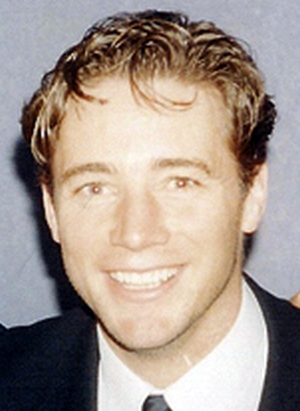Related Research Articles

Alistair Murdoch McCoist, is a Scottish former footballer who has since worked as a manager and TV pundit.

James Edward McGrory was a Scottish footballer who played for Celtic and Clydebank as a forward and then went on to manage Kilmarnock before returning to Celtic as manager after the end of the Second World War.
Robert John Little was a Scottish footballer who played as a defender for Queen's Park, Rangers, Morton and the Scotland national team.

John McPherson was a Scottish footballer who played for Cowlairs, Kilmarnock, Rangers and the Scotland national team.
Gordon Scott Durie is the Scottish former professional footballer, a utility player who usually played as a striker. He played for East Fife, Hibernian, Chelsea, Tottenham Hotspur, Rangers and Hearts. He was also capped 43 times by Scotland. After retiring as a player in 2001, in 2010, he became a coach and manager, working for East Fife and Rangers as an assistant.
George Lewis Young was a Scottish footballer who played as a defender. He is best remembered for his 16-year association with Rangers and for being the first player to receive more than 50 caps for the Scotland national team.
Andrew Cunningham was a Scottish football player and manager. He played for Kilmarnock, Rangers, Newcastle United and Scotland; his position was inside forward.
Alexander Silcock Scott was a Scottish footballer who played as a right winger.
John Miller "Ian" McColl was a Scottish football player and manager. McColl played as a defender for Queen's Park and Rangers, while he also represented both the Scotland national team and the Scottish League. After retiring as a player, he managed the Scotland national team and English club Sunderland.
Alexander Bennett was a Scottish footballer who played for Celtic, Rangers and the Scotland national team.

The 1939–40 was the 67th season of competitive football in Scotland. It would have been the 50th season of Scottish Football League, but the outbreak of the Second World War on 3 September 1939 caused the suspension of the league after five rounds of games played in Division One, and four rounds in Division Two. The league was not officially competed for until the 1946–47 season but there were regional leagues played during these years.
The Glasgow Cup is a football tournament open to teams from Glasgow, Scotland. Operated by the Glasgow Football Association, it was competed for annually by senior Glasgow clubs from 1887 until 1989. It is now competed for between the senior teams of Clyde, Partick Thistle and Queen's Park and the youth teams of Celtic and Rangers, and has used both knockout and round robin formats to determine the finalists.
David Alexander Provan is a Scottish former footballer, who played for Kilmarnock, Celtic and Scotland. While playing for Celtic, Provan won four Premier Division medals, two Scottish Cups and one League Cup.
David Prophet McLean was a Scottish footballer who played as a striker, scoring consistently throughout his career. At club level he represented Celtic, Preston North End, Sheffield Wednesday, Third Lanark, Rangers, Bradford, Dundee and Forfar Athletic. He had one cap for Scotland.
Robert Gordon Campbell was a Scottish footballer who played with Celtic and Rangers, as well as Queen's Park, Kilmarnock and Ayr United.
William Hogg was an English footballer who played at outside right, winning the Football League championship with Sunderland in 1901–02, before moving to Scotland where he won the Scottish League title three times with Rangers. He also made three appearances for England in 1902.
Thomas Smith Sinclair was a Scottish footballer who played as a goalkeeper at the start of the 20th century.
The Aberdeen–Rangers rivalry refers to football matches and related activity involving the Scottish football clubs Aberdeen F.C. and Rangers F.C.
The Scottish War Emergency League was a football league competition set up in the 1939–40 season of Scottish football, after the usual official competitions were suspended due to the outbreak of World War II.
Robert Crossan Morrison was a Scottish footballer who played mainly as an inside right.
References
- 1 2 "Don Kitchenbrand: Rangers Secret Catholic" (in Dutch). Doing the 116 Blog. 13 July 2012. Retrieved 8 June 2015.
- ↑ "Ibrox left-footers". The Glasgow Herald. 15 September 1989. Retrieved 4 February 2021.
- 1 2 3 4 5 Cramer, Trevor (10 July 2019). "Kitch's biltong beef with rival fans". Benoni City Times. Retrieved 4 February 2021.
- ↑ McDougall, Mark (10 July 2019). "When Mo Johnston signed for Rangers - how the Record reported that momentous day in 1989". Daily Record. Retrieved 4 February 2019.
- 1 2 "Kichenbrand, Don". FitbaStats. Retrieved 18 June 2018.
- ↑ "Unpredictable Celtic and Rangers". The Glasgow Herald. 3 January 2021. p. 9. Retrieved 5 March 2021.
- ↑ "Rangers Player Don Kichenbrand, Games Played 1955/1956". FitbaStats. Retrieved 16 August 2013.
- 1 2 3 4 Houghton, Ashley (7 February 2014). "Player of the Day: Don Kitchenbrand". Sunderland Association Football Club. Archived from the original on 4 March 2016. Retrieved 25 July 2014.
- ↑ "Sunderland AFC – Statistics, History and Records – from TheStatCat". Thestatcat.co.uk. Retrieved 16 August 2013.
- ↑ "Sunderland Teams 1958/59". rokerpark.com. Retrieved 24 July 2014.
- ↑ Raath, Peter (2002). Soccer Through the Years 1862–2002. Peter Raath. ISBN 0-620-29805-7.
- ↑ "Forfar Athletic Player Donald Kitchenbrand Details". Fitbastats.com. Retrieved 16 August 2013.
- ↑ "Ordeal for Scottish team at Ibrox". The Glasgow Herald. 13 March 1956. p. 4. Retrieved 18 June 2018.